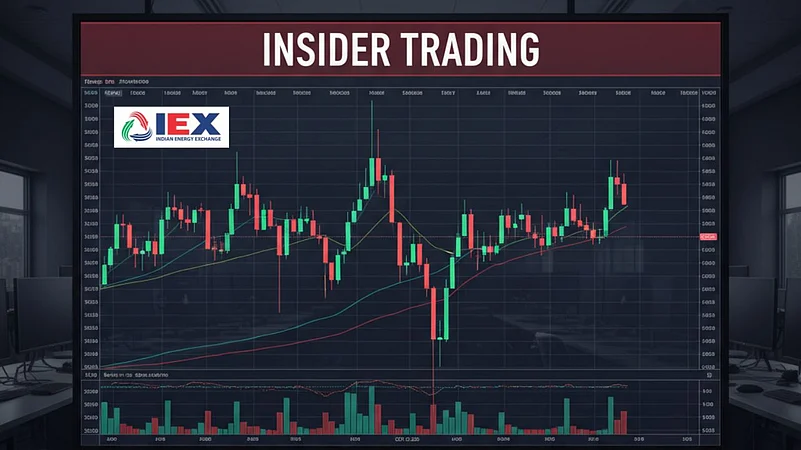IEX Insider Trading: The Securities and Exchange Board of India (Sebi) on October 15 barred eight individuals from the securities market for insider trading in the shares of Indian Energy Exchange (IEX). According to Sebi’s interim order, the group made illegal profits worth Rs 173.14 crore by trading on confidential information about a major regulatory decision before it became public.
The order said the trades took place between July 1 and August 14, 2025, and were based on unpublished price-sensitive information (UPSI) about a market coupling policy being worked on by the Central Electricity Regulatory Commission (CERC). The policy was expected to reduce trading volumes on IEX, and when it was announced, IEX stocks crashed almost 30 per cent in one day.
The eight individuals include Bhoovan Singh, his parents Amar Jit Singh Soran and Amita Soran, as well as Anita, Narender Kumar, Virender Singh, Bindu Sharma, and Sanjeev Kumar, who is also the managing director and CEO of GNA Energy Pvt. Ltd., a company regulated by CERC.
Sebi said these individuals “traded in the scrip of IEX on the basis of prior knowledge of unpublished price-sensitive information.” The regulator added that their conduct “created information asymmetry and harmed market integrity.”
What Led Sebi To Suspect Insider Trading In IEX Shares
Sebi began its examination after noticing a sharp fall in IEX’s share price on July 24, 2025, a day after CERC issued an order on implementing market coupling. The IEX stock fell nearly 30 per cent, from Rs 187.89 to Rs 132.32, and trading volumes jumped sharply. At the same time, trading in put options of IEX, which profit when prices fall, also spiked.
Sebi said, “The information in the CERC order was bound to have an impact on the pricing of the securities of IEX since the market coupling mechanism aggregates buy and sell bids from multiple exchanges and uses a central system to determine a single, uniform market clearing price.”
This led Sebi to suspect that someone had advance access to the CERC decision and traded based on it.
How Did The Information Leak
According to Sebi’s order, Bhoovan Singh, a major shareholder in GNA Energy Pvt. Ltd., obtained confidential information from Yogeita S. Mehra, Chief of the Economics Division at CERC. Mehra was directly involved in discussions and drafting of the market coupling policy. Sebi said Singh had a personal connection with Mehra, having known her from his college days.
The order said, “It was revealed that Official 1 [Mehra] had routinely shared details of internal discussions within CERC as well as communicated details with respect to internal appointments and constitution of committees with the Noticee No. 1 [Bhoovan Singh].”
Investigators found that Singh shared this information through a WhatsApp group named ‘OTC’, which included Sanjeev Kumar and Narender Kumar. The investigators further found that the group often talked about upcoming regulatory actions. Messages accessed by Sebi showed that Singh had shared internal CERC papers and meeting notes even before these were released publicly.
In a search and seizure operation carried out in September 2025, Sebi officials found digital evidence on Singh’s devices. The regulator recovered copies of confidential CERC meeting minutes, along with several deleted chats.
Sebi noted that “WhatsApp chats of Bhoovan with O1 had been deleted by him,” but investigators managed to retrieve messages from another app, Signal, showing Mehra passing on internal updates.
Coordinated Trading Before The Crash
The order found that none of the accused had traded in IEX shares before July 2025. But just days before the CERC order was made public, they all bought large quantities of IEX put options, betting that the stock would fall. They sold these positions soon after the announcement, making huge profits.
Sebi said, “There is no prima facie rationale for an investor who has rarely traded in the immediate past to take such huge positions in options trading unless he is sure about the probability of the outcome.”
The regulator said that Bhoovan Singh himself made Rs 72.03 crore, while Amar Jit Singh Soran made Rs 22.65 crore, Amita Soran Rs 31.59 crore, Narender Kumar Rs 34.53 crore, and Virender Singh Rs 7.04 crore. Together, the group made more than Rs 173 crore, which Sebi has directed to be held in fixed deposits under its lien.
The order also mentioned that some of the profits were transferred to related entities such as GNA Energy Pvt. Ltd., Jai Singh & Co., and JSC Infratech Pvt. Ltd. “Part of the alleged ill-got gains were transferred by Noticees to various connected entities,” Sebi said.
Destruction Of Evidence And Alert From NSE
Sebi’s order said that Singh deleted several WhatsApp messages after receiving a query from the National Stock Exchange (NSE) on July 31, 2025, asking for the trading rationale behind suspicious transactions. However, Sebi’s search operation found messages showing that he continued to receive updates from Mehra even during the raids. One such message was a copy of an appeal filed by IEX against the CERC order, sent by Mehra to Singh on WhatsApp.
The regulator noted that Singh also reached out to a person working in the journalism sector and asked him to share the CERC news widely “to reap maximum benefits from the fall in the price of IEX shares.”
Sebi’s Findings And Action
Sebi concluded that the accused were insiders who traded based on unpublished information. “It has been prima facie established that the CERC order was UPSI and had originated on or before July 1, 2025,” the order said.
The regulator found that Singh and his associates’ trading activity “was not regular or routine” and was directly linked to their access to UPSI. The individuals were found to have violated Regulation 3(2) and Regulation 4(1) of the Prohibition of Insider Trading Regulations, 2015, and Section 12A(d) and (e) of the Sebi Act, 1992.
Sebi’s whole-time member Kamlesh Chandra Varshney said in the order, “The manner in which the information was procured and used for trading shows a blatant disregard for market fairness and regulatory sanctity.”
As an interim measure, Sebi has barred all eight individuals from accessing or dealing in the securities market, either directly or indirectly. Their bank accounts have been frozen, and the illegal gains impounded.
A full investigation is still in progress, and Sebi said it may take further action against others found involved. “The misuse of confidential regulatory information for personal gain strikes at the core of market integrity,” Varshney said.















